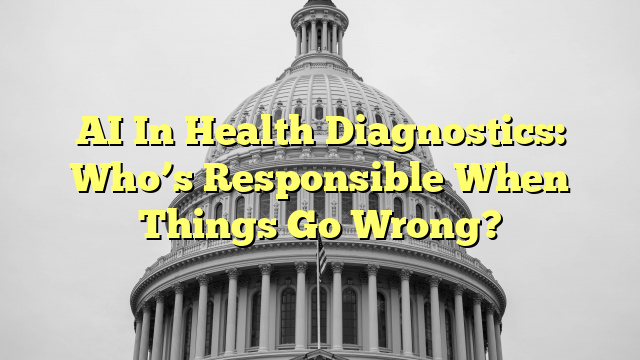Table of Contents
Responsibility for AI Mistakes
In the field of health diagnostics, the use of artificial intelligence (AI) has become increasingly prevalent. AI algorithms have the potential to analyze vast amounts of medical data and assist in diagnosing diseases with a high level of accuracy. However, when AI makes mistakes, the question arises: who is responsible?
While AI systems are designed to learn from data and improve over time, they are not infallible. Mistakes can occur due to various factors, including biased training data, algorithmic errors, or limitations in the technology itself. In such cases, responsibility for AI mistakes can be attributed to multiple parties:
- The developers and programmers who create the AI algorithms
- The healthcare professionals who use the AI systems
- The regulatory bodies overseeing the use of AI in healthcare
Ultimately, the responsibility for AI mistakes may be shared among these stakeholders, and it is important to establish clear guidelines and accountability frameworks to address potential errors.
Regulation of AI in Healthcare
As AI technology continues to advance, the need for regulation in the healthcare sector becomes increasingly important. Regulatory bodies play a crucial role in ensuring the safety, efficacy, and ethical use of AI in medical diagnostics.
Currently, different countries have varying levels of regulation for AI in healthcare. Some have established specific guidelines and frameworks to govern the development and deployment of AI systems, while others are still in the early stages of formulating regulations.
Regulation of AI in healthcare typically involves:
- Ensuring the privacy and security of patient data
- Evaluating the accuracy and reliability of AI algorithms
- Addressing issues of bias and fairness in AI decision-making
- Establishing guidelines for the responsible use of AI in clinical practice
By implementing robust regulatory frameworks, healthcare systems can mitigate the risks associated with AI and promote its responsible and beneficial use in medical diagnostics.
Role of AI in Medical Diagnostics
AI has the potential to revolutionize medical diagnostics by augmenting the capabilities of healthcare professionals and improving patient outcomes. AI algorithms can analyze complex medical data, such as imaging scans or genetic information, to assist in the early detection and accurate diagnosis of diseases.
Some key roles of AI in medical diagnostics include:
- Enhancing the speed and accuracy of diagnoses
- Identifying patterns and trends in large datasets
- Assisting in the interpretation of medical images
- Providing personalized treatment recommendations
By leveraging AI technology, healthcare professionals can make more informed decisions and improve patient care. However, it is important to ensure that AI systems are rigorously tested, validated, and continuously monitored to minimize the risk of errors or biases.
Warning about the Risks of AI in Healthcare
While AI holds great promise in healthcare, there are also risks and challenges associated with its use in medical diagnostics. Various organizations and experts have warned about these risks and emphasized the need for caution:
- The World Health Organization (WHO) has highlighted the importance of ethical considerations, transparency, and accountability in the use of AI in healthcare.
- Professional medical associations, such as the American Medical Association (AMA), have called for the development of evidence-based guidelines and standards for AI in medical practice.
- Researchers and academics have raised concerns about the potential for bias, lack of interpretability, and unintended consequences of AI


AI may be helpful when it comes to diagnostics, but it’s essential to recognize the human element of healthcare – without doctors making the final judgement, who’s ultimately accountable for a wrong diagnosis?